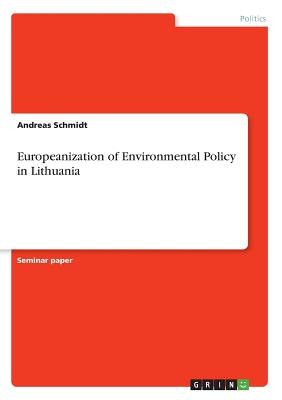
- We will send in 10–14 business days.
- Author: Andreas Schmidt
- Publisher: GRIN Verlag
- Year: 2007
- Pages: 40
- ISBN-10: 3638667162
- ISBN-13: 9783638667166
- Format: 14.8 x 21 x 0.3 cm, minkšti viršeliai
- Language: English
- SAVE -10% with code: EXTRA
Europeanization of Environmental Policy in Lithuania (e-book) (used book) | bookbook.eu
Reviews
Description
Seminar paper from the year 2005 in the subject Politics - International Politics - Region: Eastern Europe, grade: 1,0, University of Applied Sciences Bremen (Institute of International Relations and Political Sience), course: Governments and Politics in Lithuania, language: English, abstract: Environmental policy in Lithuania emerged after regaining independence in the beginning of the 1990s. The young democracy had to build up a completely new legal system and institutions. At the same time this policy field has already matured on the EU-level as well as in its member states. This paper focuses on the adaptation of Lithuanian environmental policy to the requirements of the EU and employs the concept of Europeanisation to explain changes. Europeanisation, as the term is used in this paper, is concerned with the consequences of European integration for the member and applicant states and politics within them. It is found that especially through the accession process it was easy to 'export' EU rules and principles - firstly, because the pressure to adopt EU legislation was high and secondly, because local elites were ready to take EU templates. After an introduction to the topic the second chapter presents an overview over EU environmental policy, whereas the third chapter focuses on Lithuanian environmental policy and the adaptations through the EU accession process. Chapter four then employs the concept of Europeanisation to explain the impact of EU environmental policy on Lithuanian domestic policy-making and its institutions.
EXTRA 10 % discount with code: EXTRA
The promotion ends in 22d.08:37:06
The discount code is valid when purchasing from 10 €. Discounts do not stack.
- Author: Andreas Schmidt
- Publisher: GRIN Verlag
- Year: 2007
- Pages: 40
- ISBN-10: 3638667162
- ISBN-13: 9783638667166
- Format: 14.8 x 21 x 0.3 cm, minkšti viršeliai
- Language: English English
Seminar paper from the year 2005 in the subject Politics - International Politics - Region: Eastern Europe, grade: 1,0, University of Applied Sciences Bremen (Institute of International Relations and Political Sience), course: Governments and Politics in Lithuania, language: English, abstract: Environmental policy in Lithuania emerged after regaining independence in the beginning of the 1990s. The young democracy had to build up a completely new legal system and institutions. At the same time this policy field has already matured on the EU-level as well as in its member states. This paper focuses on the adaptation of Lithuanian environmental policy to the requirements of the EU and employs the concept of Europeanisation to explain changes. Europeanisation, as the term is used in this paper, is concerned with the consequences of European integration for the member and applicant states and politics within them. It is found that especially through the accession process it was easy to 'export' EU rules and principles - firstly, because the pressure to adopt EU legislation was high and secondly, because local elites were ready to take EU templates. After an introduction to the topic the second chapter presents an overview over EU environmental policy, whereas the third chapter focuses on Lithuanian environmental policy and the adaptations through the EU accession process. Chapter four then employs the concept of Europeanisation to explain the impact of EU environmental policy on Lithuanian domestic policy-making and its institutions.


Reviews